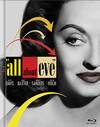





The Little Foxes (1941)
Cast | Crew | Awards | Articles | Screen Caps Gallery | Bibliography | Links | Image Credits
| Article 2 |
'The Little Foxes,' Full of Evil, Reaches the Screen of the Music HallBy Bosley CrowtherThe New York Times August 22, 1941 page 19Lillian Hellman's grim and malignant melodrama, "The Little Foxes," which had the National Theatre's stage running knee-deep in gall and wormwood the season before last, has now been translated to the screen with all its original viciousness intact and with such extra-added virulence as the relentless camera of Director William Wyler and the tensile acting of Bette Davis could impart. As presented at the Music Hall yesterday, under the trade-mark of Samuel Goldwyn, "The Little Foxes" leaps to the front as the most bitingly sinister picture of the year and as one of the most cruelly realistic character studies yet shown on the screen.No one who saw the play need be reminded that Miss Hellman was dipping acid straight when she penned this fearful fable of second-generation carpet-baggers in a small Southern town around 1900. Henrik Ibsen and William Faulkner could not together have designed a more morbid account of inter-family treachery and revoltingly ugly greed than was contained in Miss Hellman's purple drama of deadly intrigue in the Hubbard clan. And with a perfect knowledge of the camera's flexibility, the author and Mr. Wyler have derived out of the play a taut and cumulative screen story which exhales the creepy odor of decay and freezes charitable blood with the deliberation of a Frigidaire. Frankly, there is nothing pretty nor inspiring about this almost fustian tale of Regina Giddens's foxiness in planting figurative knives in her own deceitful brothers' backs, of her callous neglect of her good husband when he is dying of a heart attack, all because she wants to grab the bulk of the family's rising fortune for herself. The whole suspense of the picture lies in the question of who's going to sink the last knife. Even the final elopement of Regina's appalled daughter, for whom the film conveniently provides a nice romance, adds little more than a touch of leavening irony. Regina is too hard a woman to mourn much for anything. Thus the test of the picture is the effectiveness with which it exposes a family of evil people poisoning everything they touch. And this it does spectacularly. Mr. Wyler, with the aid of Gregg Toland, has used the camera to sweep in the myriad small details of a mauve decadent household and the more indicative facets of the many characters. The focus is sharp, the texture of the images hard and realistic. Individual scenes are extraordinarily vivid and compelling, such as that in which the Hubbard brothers plot a way to outdo their sister, or the almost unbearable scene in which Regina permits her husband to struggle unassisted with death. Only when Mr. Wyler plays obvious tricks with mirrors does a bit of pretension creep in. And Miss Davis' performance in the role which Tallulah Bankhead played so brassily on the stage is abundant with color and mood. True, she does occasionally drop an unmistakable imitation of her predecessor; she performs queer contortions with her arms like a nautch-dancer in a Hindu temple, and generally she comports herself as though she were balancing an Academy "Oscar" on her high-coiffed head. But the role calls for heavy theatrics; it is just a cut above ten-twent'-thirt' Miss Davis is all right. Better than that, however are the other members of the cast. Charles Dingle as Brother Ben Hubbard, the oldest and sharpest of the rattlesnake clan, is the perfect villain in respectable garb. Carl Benton Reid as Brother Oscar is magnificently dark, sullen and undependable. Patricia Collinge repeats her excellent stage performance as the faded flower of the Old South who tips the jug. Teresa Wright is fragile and pathetic as the harassed daughter of Regina. Dan Duryea is a shade too ungainly as Oscar's chicken-livered son, and Herbert Marshall is surprisingly British for a Southerner born and bred, but both fill difficult roles well. "The Little Foxes" will not increase your admiration for mankind. It is cold and cynical. But it is a very exciting picture to watch in a comfortably objective way, especially if you enjoy expert stabbing-in-the-back. © 1941 The New York Times |
|
Return to the
Index of Articles. |
| Now in Print! |
|---|
| Now on DVD! |
|---|
Buy Videos & DVDs |
|
Buy Movie Posters |
|
Buy Movie Posters |
|
Classic
Movie Merchandise |
|
![]() Printer-friendly version.
Printer-friendly version.
![]() Return
to the top.
Return
to the top.
Last updated:
March 10, 2011.
Reel Classics is a registered trademark of Reel Classics, L.L.C.
© 1997-2011 Reel Classics, L.L.C. All rights reserved. No
copyright is claimed on non-original or licensed material.
Terms of
Use.









